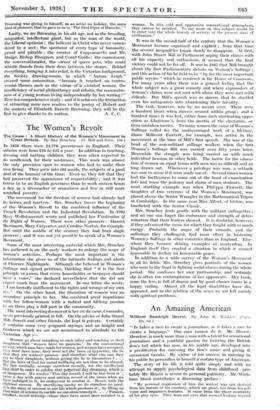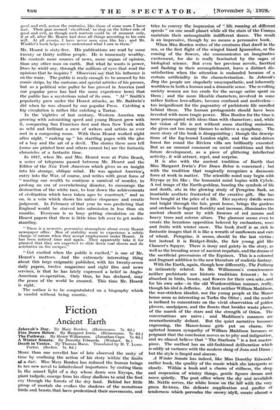An Amazing American
" IT takes a race to create a journalism, as it takes a race to create a language." One man cannot do it. Mr. Hearst, therefore, is much more than a man with a talent for sensational
journalism and a youthful passion for twisting the British lion's tail which has now, in his middle age, developed into a predilection for caressing the lion's mane and giving it
occasional tweaks. By virtue of his success in catering to his public he personifies in himself a certain type of American.
The story of his life is told quite simply and with no attempt to supply psychological data from childhood— pro. bably Mr. Hearst is averse to personal publicity. Mr. Wick-
ham Steed contributes a discerning preface : . .
" My personal impression of him (he writes) was not derived from his stature or his courtesy, which are great, nor from his soft voice a.nd:impassive- features.- Iteame..from the-sheer neutrality- of his grey eyes. They were not eyes that seemed looking beyond
good and evil, across the centuries, like-these of some seers I have
ihet. Their gaze seemed to-stob on the hither' ide of good and evil, as though such matters could be of moment only, if at all, after Mr. Hearst had done all things according to his own will. At all events, I have never seen eyes like his ; and Mr. Winkler's book helps me to understand what I saw in them."
Mr. Hearst is sixty-five. His publications are read by some twenty or thirty million people. He is immensely wealthy. He controls more sources of news, more organs of opinion, than any other man on earth. But what he wants is power. Does he wield any, through the millions of eyes that read the Opinions that he inspires ? Otiserverssay that his influence is on the wane. The public is ready enough to be amused by his comic strips, by the cartoons and special articles of his presses, but as a political wire puller he has proved in America (and our popular press has had the same experience here) that the public has a mysterions mind of its own. " Al " Smith's popularity grew under the Hearst attacks, as Mr. Baldwin's did when he was abused by our popular Press. Catching a big circulation is rather like catching a Tartar.
- In the 'eighties of last century, Western America was growing with astonishing speed and young Hearst grew with it, conquering San Francisco first and then New York with as wild and brilliant a crew of writers and artists as ever met in a Composing room. With thein Hearst worked night after night, " making up " his startling pages with the glee of a boy and the art of a devil. The stories these men tell (some are printed here and others cannot be) are the fantastic chronicles of a fantastic time.
In 1917, when Mr. and Mrs. Hearst were at Palm Beach, a series of telegrams passed between Mr. Hearst and the Editor of the New York American which gives us an insight into his strange, oblique mind. He was against America's entry into the War, of course, and writes with great force of "wasting our wealth to continue a carnival of murder, to prolong an era of overwhelming disaster, to encourage the' destruction of the white race, to tear down the achievements of civilization which have taken ages to construct," and so on, in a vein which shows his native eloquence' and erratic judgment. In February of that year he was predicting that England would be starved into submission in less than six months. Everyone is so busy getting circulation on the Hearst papera that there is little time left over to get under- standing.
" There is a neurotic, percussive atmosphere about every Hearst newspaper office.- Men of 'stability seem- to eXperience a subtle change of nature when they accept employment under Hearst. It has been noticed time and again. They apparently take it for granted that they are expected to slide down coal shoots and do acrobatics on fire escapes.' ' - " Get excited when the public is excited," is one of Mr. _ Hearst's mottoes. And the extremely interesting thing about this large enigmatic publisher, with his twenty-seven daily papers, twelve magazines and eight film and news services; is that he has lately expressed a belief in Anglo- American co-op.eratiOn. Only thus, he has declared, may the peace of the world be ensured. -I'll& time Mr. Hearst is right. -
The author is to be congratulated on a biography which is candid without being caustic.



















































































































 Previous page
Previous page